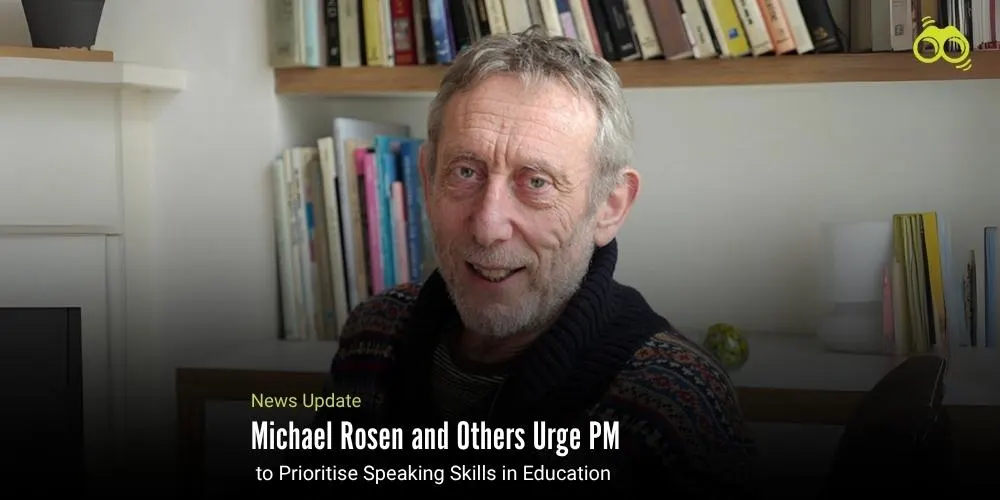Voice 21 Leads Campaign to Embed Speaking Skills in England’s Schools
Call to Recognise Oracy as Fourth ‘R’ Gains Momentum Among Influential Figures
In a renewed appeal for educational reform, a coalition of 60 influential voices, including children’s author Michael Rosen, former political strategist Alastair Campbell, and ex-education secretaries Charles Clarke and Estelle Morris, has urged Prime Minister Sir Keir Starmer to honour his pre-election pledge to prioritise speaking skills in England’s schools. Their intervention comes amid growing concern that oracy, despite its well-documented benefits, remains marginalised within the national curriculum.
The group signed an open letter addressed to the Prime Minister, advocating for oracy to be embedded as a core element of the revised curriculum. They proposed that oracy be formally recognised as the fourth ‘R’ in education, alongside reading, writing, and arithmetic, highlighting its essential role in developing communication, confidence, and critical thinking among pupils. Supporters of the initiative recalled Labour’s 2023 commitment to elevate oracy within education policy. However, campaigners expressed concern over its absence from the interim curriculum review, fearing that the issue may be losing political traction. The final report is expected later this year.
The letter, coordinated by the oracy charity Voice 21, reminded the Prime Minister of his promise to ensure every child develops key speaking and listening skills. It emphasised the growing relevance of oracy in a world shaped by artificial intelligence, social fragmentation, and economic inequality. Michael Rosen described spoken language as central to identity and communication, asserting that schools are uniquely positioned to nurture these skills with appropriate teacher support. Alastair Campbell, now a mental health advocate, stressed that oracy is vital for building confidence, promoting critical thinking, and strengthening social cohesion.
Other signatories included author and educator Jeffrey Boakye, Sutton Trust CEO Nick Harrison, and education professor Rupert Knight. Kate Paradine, CEO of Voice 21, reiterated that Sir Keir Starmer had previously recognised oracy’s importance and urged the government to uphold its manifesto pledge by ensuring universal access to high-quality oracy education. In response, a Department for Education spokesperson stated that the reform plan aims to equip all young people, regardless of background, with essential speaking and listening skills. The government has already invested in early-years language support, such as the Nuffield Early Language Intervention, and enhanced teacher training to prioritise oral communication. Final recommendations from the independent curriculum review, due in autumn, will guide future efforts to ensure students communicate clearly and confidently. This collective call reflects a growing consensus that oracy must be central to modern education, preparing young people to thrive in an increasingly complex and connected world.
Editor’s Note:
In today’s world, where digital tools, artificial intelligence, and social change are shaping our lives, learning to speak, listen carefully, and work well with others is more important than ever. It is time for schools in England to update their priorities by making oracy (speaking and listening skills) a core part of the national curriculum. A recent open letter to the Prime Minister, signed by teachers, public figures, and former education leaders, shows just how urgent this issue is. They believe that oracy should be valued just as much as reading, writing, and maths. Being able to express ideas, listen to others, and take part in meaningful conversations helps students succeed at school, in their future careers, and in society. Including oracy in the curriculum can help students grow their vocabulary, improve memory, and strengthen their thinking skills across all subjects. For children from less advantaged backgrounds, learning to speak and listen with confidence can open doors to more opportunities and help them feel equal with their peers. The government has already made some progress by investing in early language development and teacher training. But now, with a final curriculum review coming soon, there is a chance to take stronger action.
Skoobuzz believes that teaching young people how to speak and listen well is not just important for school, it’s a key part of building a fairer, smarter, and stronger society.














0 Comments (Please Login To Continue)